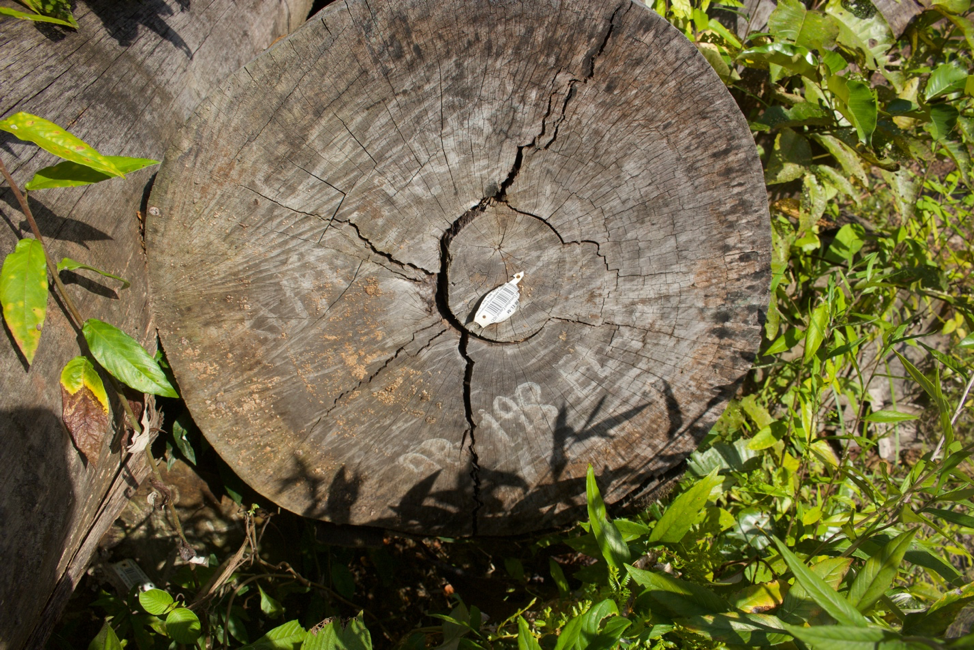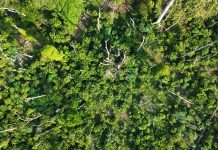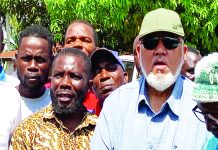Top: The International Consultant Capital has abandoned thousands of logs in the Gbi-Doru District. The DayLight/James Harding Giahyue
By James Harding Giahyue
GBI-DORU DISTRICT, Nimba County – Sylvester Garsaynee might have been elected chairman of a group that represents the interest of locals in a logging concession in one of Liberia’s most forested regions. However, he has been welcomed by an estimated 5,000 abandoned logs and outstanding payments and projects, which burdened his predecessor in the last three years.
Between 2018 and 2019, the International Consultant Capital (ICC) felled the logs in the Gbi-Doru Administrative District and the Gbier & Gblor Chiefdom. But it abandoned the logs in the forest ever since amid a row with the community over a bridge, with the Forestry Development Authority (FDA) taking no actions mandated by forestry laws and regulations to avoid waste of the woods.
ICC had signed a social agreement with villagers in 2016 as part of its 25-year concession with the Liberian government in 2009, known across the logging industry as Forest Management Contract K or FMC-K Nimba. It covers 127,842 hectares in the northeastern county and extends 40,887 hectares in River Cess and 98,181 hectares in Grand Gedeh. The contract lasts for 25 years but affected towns and villagers must elect new members to their community forest management committee every five years and review their agreement with the company. That is how Garsaynee entered the fray.
“The first thing we are going to do is to make sure the logs are transported from the bush,” Garsaynee told The DayLight in a mobile phone interview from Glahn’s Town, the headquarters of the community forest leadership.
“After that, we will work with the company to make sure it pays the cubic meter fees, the scholarship fees and other fees it owes us,” he added. In forestry, cubic meter fees are the product of the total diameters of all the harvested logs and a particular rate set in an agreement, US$2.25 in this case.
The past leadership of the community had demanded the German company repaired the facility after a log bridge the company built collapsed. The metal passage over Gwen Creek connects the only other road in the area. But when efforts by the pair to sign a memorandum of understanding over the bridge failed, the community asked the FDA to auction the logs and share the proceeds with the community.
“We are of the conviction that those resources are meant to enhance the livelihood of the communities and to generate taxes for the national government,” Jerry Gbaye Sr., whom Garsaynee would replace, wrote in a letter to FDA Managing Director Mike Doryen in November last year. That request was not granted.
Though the logs are abandoned, it is much harder for them to be auctioned, according to FDA’s Regulation 116-17. Depending on their location, logs are abandoned if they are left unattended between 15 and 180 working days, the law requires. But the FDA can only auction it if no one claims them following months of the legal notice and a court warrant, which our investigation showed has not been done in this case.
The FDA investigated the situation itself in August 2020 as part of an “assessment of abandoned logs in concession areas in region three” (Grand Bassa River Cess and Nimba). It found that ICC had abandoned 3,066 pieces or 18,272.158 cubic meters of logs and that some of the unattended logs had been “sold to a local sawmill/mini-mart operator.
“Logging contract holders are not doing much to minimize the incidence of abandoned logs,” the report said at the time. “Much needed revenue that government requires for national development has been lost due to the unprecedented abandonment of the assorted round logs by logging companies.”
The DayLight could not independently verify the number of abandoned logs. The FDA denied us access to the company’s production record, despite forestry laws and regulations guaranteeing public access to such information. Gbaye and other community leaders we interviewed put the number to over 7,000 but did not show any proof.
Also, the FDA imposed no fines on ICC for abandoning the logs, a violation of Regulation 116-17. The regulation calls for grave penalties for an act that “intentionally or negligently causes any logs, timber or timber products to become abandoned.” Penalties include a payment three times the prices of the total volume of species of abandoned logs at the world market price and forfeiture of either a company’s harvesting or export certificate. Created in October 2017, the statute’s purpose is to minimize the waste of forest resources and compel legal compliance in the harvesting and shipment of logs, timbers and timber projects.
‘We are waiting’
In March, the community and company met to resolve their dispute, according to minutes of a mediatory meeting, conducted by the Liberia Timber Association, the FDA and the National Union of Community Forest Development Committee.
Chris Bailey, ICC’s representative at the resolution meeting in Glahn’s Town, accused the community of demanding the company to pay US$1 million before using the bridge, according to the minutes.
Gbaye denies that accusation, saying the amount was an estimated cost of the project, not a fee for the community.
Garsaynee said the company agreed to repair the bridge and conducted a feasibility study on the facility shortly after he replaced Gbaye. “We are waiting on them,” he said. “Everything is now in their hands.”
The DayLight has reached out to Cesare Colombo, ICC’s CEO, for comments. ICC is owned by the estate of the late Liberian businessman Mulbah Willie and the Liberia Wood Industry, a subsidiary of the Liberian Investment Association Limited and Nimarks International Corporation, the articles of incorporation of the companies show.

Apart from the abandoned logs, ICC has failed to live up to a social agreement it signed with the community. It has not paved a major road linking Glahn’s Town to Dorgbor Town, Gbi-Doru’s headquarters. It has yet to provide four overdue handpumps as per the deal. It has ceased to pay an annual US$6,500 for scholarships since 2018 and has not held mandatory, quarterly meetings with locals since 2019, our investigation showed.
Beginning 2020, the community had written Colombo, FDA, and other stakeholders in the forestry sector on the overdue payments and projects, letters The DayLight saw indicate. In a letter to Doryen on April 16 last year, the community said ICC’s failure to meet up with its obligations “has posed a severe embarrassment to communities’ projects, [ongoing] construction and… projects that should have been already in process.” Overdue payment is a violation of forestry laws and regulations. It is a pre-qualification requirement for licenses, shipment permits, and a ground for the cancellation of contracts.
Bailey blames the company’s failure on illicit chainsaw millers and farming activities in the contracted forest, according to minutes of the mediatory meeting. He falsely claims that the Glahn’s-Town-Dorgbor-Town road is not in their agreement. “The road will commence from Glahn’s Town to Dorgbor Town in the second phase of the social contract…,” the agreement says.
There were signs things are not going as planned following the March meeting of the community and the company. The parties agreed in their Glahn’s Town meeting that they would have met in Monrovia by now to continue their settlement but that has yet to happen.
The FDA did not reply to our queries for comments. We wrote Doryen a letter to that effect in January this year but did not get a reply. That was after we had emailed the top managers of the agency on the matter in December last year. Weedor Gray, the technical manager of the community forestry department, also did not respond to queries regarding the outstanding meeting between the community and the company.
Funding for this story was provided by the Civil Society Independent Forest Monitors (CS-IFM). The DayLight maintained complete editorial independence over its content.





Facebook Comments